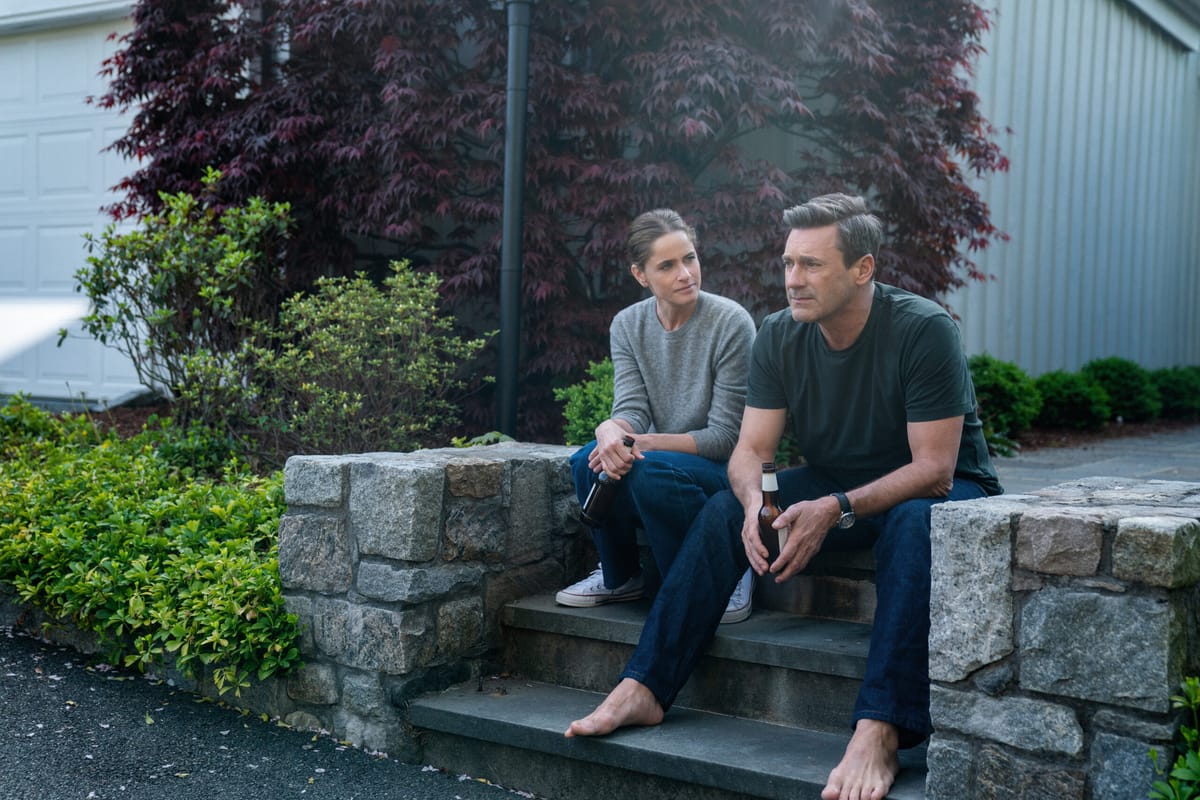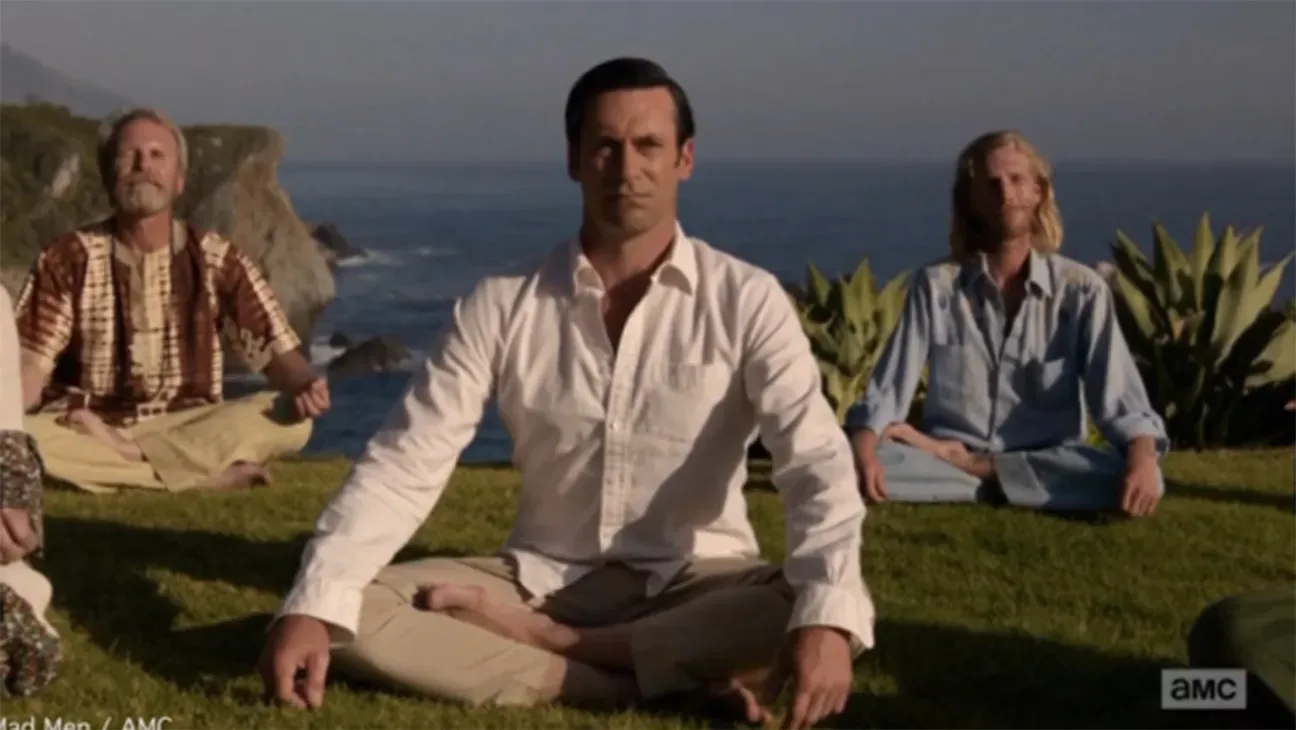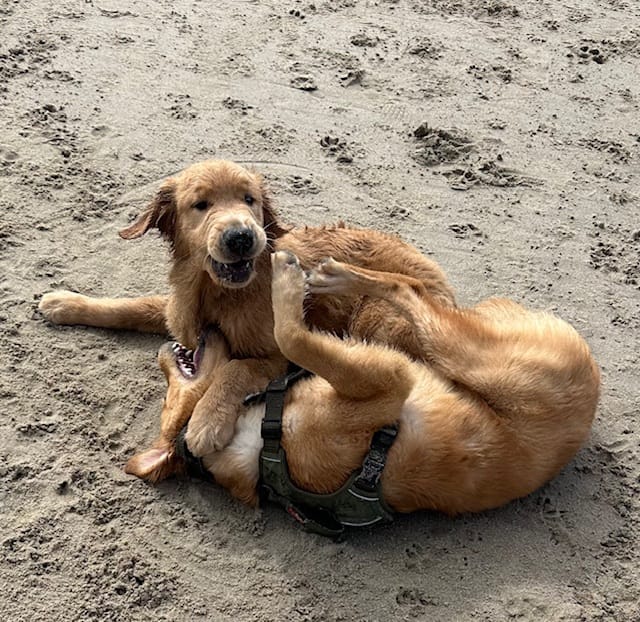How Did This Become Our Lives?

“Your Friends and Neighbors” Lands In A Place Jon Hamm Owns
The headline that leads off this post is a quote from Episode 8 of the above-referenced series on AppleTV+, the penultimate offering in a first season that will conclude Friday, May 30. (The streamer recently renewed the show for a coming season.) It’s a query that does a fair amount of work in encapsulating the show’s largest question—how did these suburbanites, attractive, wealthy, and yes, wildly overprivileged– become enmeshed in such spiraling agonies? And has their woe been brought about through their own misjudgments and miscues?
It's an ensemble of miserables, this show, and the key players are so much of their own time and place—golf club and “cancer gala” America as the confused phalanx of born-in the 70s, post-boomers live it—that I’m unlikely to tout it to my early-20s son. (He’s all in for “The Penguin” and why not? It’s a murky playbook for the post-apocalyptic robber -baron capitalism we’ve handed over to his cohort.)
One doesn’t want to pound too hard on the wider implications the title posits, even while suffering mutely as the current administration remorselessly wrecks the world. And yet: the concluding Episode 9 is entitled, “Everything Becomes Symbol and Irony”.
In case we were missing the social critique the show embodies, the very Episode 8 under discussion here is titled, “When Did We Become These People?” As the quoted scene plays, we hear the tag line: “When did our lives get so empty?”
Such philosophical moaning may to some sound doctrinaire, even at first to that swelling boomer audience that, per my casual survey among friends of a certain age, has quite avidly embraced the show. As this bunch seeks to embrace a seventh decade (previously unthinkable, of course, until it showed up unbidden) they are in a posture to kibitz, but helpless to warn the show’s dramatis personae to duck and cover as Time the Avenger crosses their sprinklered lawns to knock at the mansion door. Show runner Jonathan Tropper was himself born in 1970 and is thus well positioned to sort through the midlife trials of his characters, who feasibly also hover around age 55.
As he told the `eurweb’ site:
https://eurweb.com/2025/jonathan-tropper-your-friends-and-neighbors-interview/
…the inspiration for the show’s premise came a few years before the pandemic, but had been nestled in his imagination even as he spent over two decades in other television realms: “I had this notion of a hedge fund manager who loses his job and starts robbing his friends and neighbors. And it just stayed with me. And eventually I had the freedom and the time to develop it as a show.”
Tropper, who as a showrunner seems to share credits readily (the eighth episode was written by Bryan Parker), was mindful that the burglary aspect might be “hard to swallow” if the show went for straight drama.
As Tropper’s six novels, all either adapted or optioned to be filmed, make evident, the writer found his wheelhouse early on after a life in New York’s Westchester County, specifically New Rochelle: “They were about families and men in this world screwing up their lives.” His 2003 novel “This Is Where I Leave You,” was adapted for a 2014 film by Shawn Levy, with Jason Bateman as central figure Judd epitomizing what the New York Times book review had noted: “This author’s strong suit is wisecracks, the more irreverent the better…he gives snarky allure to Judd’s observations.” Judd’s sister Wendy (Tina Fey) is married to a character who is a sort of template for Jon Hamm’s Andrew Cooper in “Your Friends…”; he’s cited by the Times as “a flashy businessman who maintains an oblivious attitude toward family events, whether those events are happy or tragic.” Adds the review, “’Billions of dollars are involved, so things like a kid’s birthday or a wife’s dead father are simply not at the top of the agenda,’ Judd says of him.”
In Trumpland, where the President’s hyena cackle of grifters practice a cold if zealous greed amidst their governance-wrecking prerogatives, an immersion in materialism and mendacity hardly strikes us as fiction. But again, those in the show’s boomer audience demo, raised with the long if tattered tail of post-hippie values, are bound to take some comfort in watching it all crash down in the town the show calls “Westmont Village,” where one character can only wonder, "How did this become our lives?"
And who's not wondering that these days?
Tropper freely tells interviewers that he only fully engaged in mounting the show when Jon Hamm, now 55, assured him of interest in the role. He is indeed the show’s indispensable element, as screen time alone would dictate. Ad exec Don Draper, as Hamm played him from 2007-2015 in “Mad Men,” wore his superciliousness as part of his charm. As we saw the character’s flawed underpinnings, we bought into his darkness and still felt enough charity to wish him well as a guy who found his way to sitting in the lotus position on a halcyon Big Sur hilltop.

Next, flip the calendar pages through a few decades of war, booming economic times, more war, incipiently corrupt Republican politics, and the hedge fund infestation, and you get Coop, the tennis-star Princeton grad with the proper smooth-limbed wife and the once best friend Nick, a black former NBA star who we quickly learn has stolen her. (Much as Judd is cucked by a media star in “This Is Where I Leave You.”)
As his sporadic, skilled turns on the small screen (if less so in films) have shown, Hamm can well anchor a deft ensemble such as Tropper has assembled. As the nipple-ringed, haywire lawman/pol in 2023’s “Fargo,” as a Musk-like billionaire tech tycoon in “The Morning Show,” and as a doomed oil tycoon hearkening to the cracker wisdom of stunt-cast’ed Jerry Jones in “Landman,” he’s owned any number of scenes; but as the pivot point of “Your Friends” he may be in for a run that evokes the Draper years. At this writing, nobody but the producers knows if Coop will pay a price for refusing to cop a plea when accused—“set up” is how he puts it—for the bloody end of a cooly blunt Olivia Munn’s widely loathed, mysteriously murdered husband.
As we’ve seen for a good while, one of Hamm’s compelling virtues as an actor is his willingness to deliver on his characters’ unlikable moments. One notable example comes when Mark Tallman’s Nick invites him over for a kind of suburban hootenanny of male camaraderie--a haute-bougiecookout with booze high on the menu.
Herewith in depicting the thoroughly entertaining eighth episode begin a few light spoilers, so if you’re not as deep in the episode slate as your correspondent, himelf now eager for the season finale—best put a pin in this post.
Still around to hear Coop’s response? Hamm waits a seething beat, then offers, “Hard pass, Nick.”
As he’s wont to do, Hamm carries his big-dudeness and noble features ever so watchably, living in Coop’s subdued vanity and none the less magnetic for carrying a slight girdle of flesh around his middle. Coop’s usual mien is a slight, assaying frown, and another knack Hamm often shows in how he’ll deliver a line in calm cadence, adding just a frisson of irony to (not quite) bleed off the insult part. He's well matched with Amanda Peet's febrile Mel—when cuckolded ex Coop tells her as his suddenly needy ex with benefits about a certain damaging video, there’s a sweetness to his throttled bitterness that’s sheer Hamm—with two ‘m’s, mind you.
Anyone who’s raised a teenage son will relate to Mel’s plaint that she can’t get two sentences out of the lad, so we focus hard on Coop as he’s having a longed- for man-to-man chat with the recessive Hunter. Having advanced their perilously maintained closeness, Hunter not only sees but smells his dad’s degree of wreckage as highlighter after an apocalyptic all-nighter. The toot-fueled boite crawl beagn when Hoon Lee’s wonderfully wry Barney Choi had suggested that the trio of frenemies, “Things being what they are, get well and truly hammered,” and a frenzied stalk towards the bleary dawn kicked off . "You stink,” says Hunter indulgently (kids become the grownups on this show) to his half-estranged dad. It’s in that fragile but loving, odoriferous moment that Coop radiates a quiet gratitude for the connection, but in his fashion will move on to the next agenda with calm chill. “Thank you,” he says, “Good note.”
With an episode—and at least one more season—to go, we the show’s stans are fully wondering how, indeed, this hyper-advantaged one percent cadre have come to this stage. “This was once my entire world,” muses Coop in a voice-over as he replays the past domesticity, and his tone sounds as battered as his bruised and bloodied face, “How the fuck did I not see it coming?”
Show runner Tropper has signaled a “pretty surprising” ending, and the guess here, as the few hours until airtime tick off, is that we may be asking the same question.


Comments ()